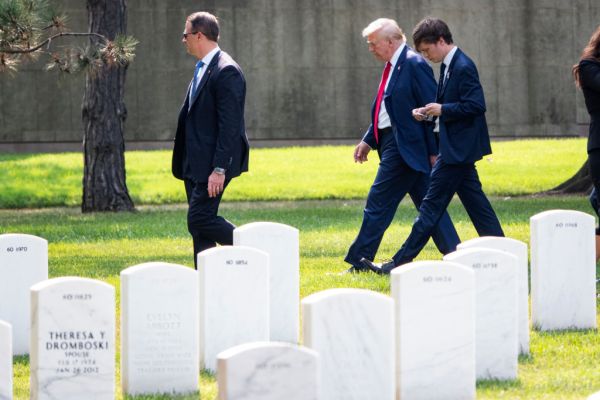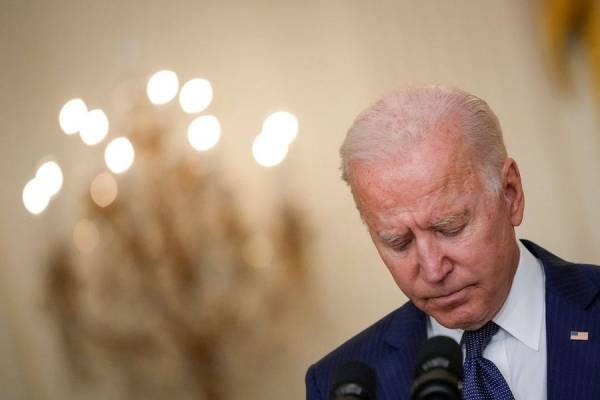“He fights!” they say. But not when it matters.
Donald Trump has decided that the U.S. withdrawal from Afghanistan is a winning issue in the election he is currently losing to Kamala Harris. And the U.S. withdrawal from Afghanistan was, indeed, a fiasco, possibly the lowest moment in the generally feckless and incompetent administration of Joe Biden, something like a humiliating reenactment of the flight from Saigon.
But, of course, there is more to the story. Predictably, Trump is about as honest about foreign policy as he is about his golf score. If he wants to know how the U.S. lost Afghanistan, he need only consult the cheeseburger-eating surrender monkey in the mirror.
Speaking to veterans’ families at Arlington National Cemetery—because why not stage a rally on the graves of the fallen?—Trump suggested that his administration had enjoyed an 18-month period of quiet in Afghanistan, with no U.S. deaths. That isn’t true: There were no U.S. deaths in Afghanistan in the final 11 months of the Trump administration, and that trend continued through the first seven months of the Biden administration. In fact, Americans died in Afghanistan in 2017, 2018, 2019, and 2020—all years during which Donald Trump was president of these United States. There were 45 U.S. combat deaths in Afghanistan during the Trump years, and another 18 elsewhere, for a total of 63. That’s more, not fewer, than have died on Biden’s watch: 13 were killed through 2022, according to the Pentagon’s most recently published official tally, and another three died in Jordan in January of this year.
We mourn every fallen troop, of course, but the point of U.S. military engagements abroad is not simply to avoid casualties—the point is to win. And it was Donald Trump—not Joe Biden—who lost Afghanistan. As a matter of fact, Donald Trump publicly cheered Biden’s plan to withdraw from Afghanistan and argued for an even more headlong timeline—a position that he held right up until the second he decided it might be a useful issue for him.
Let us recall the facts.
In February 2020, the Trump administration negotiated a deal with the Taliban, known as the Doha Agreement. At that time, the Taliban was not the government of Afghanistan—but Trump believed that the jihadist militia would defeat the government in Kabul, eventually, and wasn’t interested in doing what it would take to prevent that. Before it was undermined by Trump’s surrender to the Taliban, Afghanistan’s government under Ashraf Ghani—a Columbia-educated reformer who once served on the student council of Lake Oswego High School in Oregon and who was not exactly a beardy bomb-thrower from the mountains—was weak and struggling with corruption and all the usual problems of trying to govern ungovernable Afghanistan. But it also was trying to rein in the warlords, develop the economy, and clean up the civil service rather than trying to stage a worldwide jihad. Trump made a deal not with the government of Afghanistan but with the terrorists who were trying to overthrow it and who, in the absence of U.S. support, soon succeeded in doing so.
The Taliban isn’t just some desert rabble with no connection to the United States: The group played host to the jihadists who carried out the attacks of September 11, 2001—that’s why the U.S. was bothering with Afghanistan in the first place. The Trump administration immediately began reducing the U.S. presence in Afghanistan and promised the terrorists that we’d be out entirely by May 2021, all but inviting them to renew attacks on U.S. troops should that deadline pass.
And then Trump lost the 2020 election, fighting the results a hell of a lot harder than he ever fought the Taliban.
His successor came into office with a weakened military position in Afghanistan and Trump’s commitment to get out by a certain date. Biden’s subsequent mistakes were many: For one thing, he attempted to stage the withdrawal from a position of military vulnerability; for another, he left U.S. allies twisting in the wind, barely consulting our NATO partners, who protested being shut out after having shed their own blood to help Washington in Afghanistan. It wasn’t only Americans who died in that conflict: 457 British soldiers gave their lives, 159 Canadians, 90 French, 62 Germans, 53 Italians, 44 Poles, 43 Danes, 41 Australians, 35 Spanish, 32 Georgians, 27 Romanians, 25 Dutch, 15 Turks, 14 Czechs, 10 New Zealanders, 10 Norwegians … the list goes on. Biden later protested that he’d been boxed in by his predecessor, but he had the power to unbox himself.
But Biden’s biggest mistake in Afghanistan was following the lead of Donald Trump—the man who surrendered to the very people who abetted the murder of thousands of his fellow New Yorkers. But, of course, Trump—a draft dodger whose fictitious bone spurs kept him out of harm’s way in the Vietnam era—had spent 9/11 musing that, with the fall of the Twin Towers, he could finally boast of having the tallest building in Lower Manhattan. True to Trump style, that was callous, vain, and—Trump being Trump—a lie.
Nation-building is a long, expensive, frustrating thing. How long a commitment does it require? Ask U.S. Forces Japan about that and they’ll tell you it’s something on the order of 67 years—and counting. And if future U.S. governments decide that they do not wish to follow the unhappy example of George W. Bush and instead forgo such projects, it will be difficult to blame them.
But let’s not pretend that the conditions that were obtained in Afghanistan prior to the election of Joe Biden amounted to peace—for the Afghans, for us, or for anybody else involved. U.S. troops won the fight in Afghanistan—Trump lost the war.
“He fights!” they say. But fighting the Taliban? Trump was harder on Stormy Daniels.







Please note that we at The Dispatch hold ourselves, our work, and our commenters to a higher standard than other places on the internet. We welcome comments that foster genuine debate or discussion—including comments critical of us or our work—but responses that include ad hominem attacks on fellow Dispatch members or are intended to stoke fear and anger may be moderated.
With your membership, you only have the ability to comment on The Morning Dispatch articles. Consider upgrading to join the conversation everywhere.